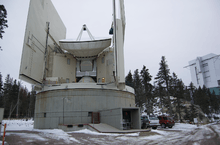Heinrich Hertz Submillimeter Telescope
 | |
| Alternative names |
Submillimeter Telescope |
|---|---|
| Observatory |
Mount Graham International Observatory |
| Location(s) | Mount Graham, Arizona, US |
| Coordinates |
32°42′06″N 109°53′28″W / 32.701611°N 109.891244°WCoordinates: 32°42′06″N 109°53′28″W / 32.701611°N 109.891244°W |
| Organization |
Arizona Radio Observatory |
| Altitude |
3,185 m (10,449 ft) |
| Telescope style |
Radio telescope |
| Diameter |
10 m (32 ft 10 in) |
| Secondary diameter |
0.69 m (2 ft 3 in) |
| Mass |
44.76 t (44,760 kg) |
| Focal length |
3.5 m (11 ft 6 in) |
| Mounting |
Altazimuth mount |
| Website |
aro |
 Location of Heinrich Hertz Submillimeter Telescope | |
The Submillimeter Telescope (SMT), formerly known as the Heinrich Hertz Submillimeter Telescope, is a submillimeter wavelength radio telescope located on Mount Graham, Arizona. It is a 10-meter-wide parabolic dish inside a building to protect it from bad weather. The building front doors and roof are opened when the telescope is in use. The telescope's construction was finished in 1993. Along with the 12 Meter Telescope on Kitt Peak, this telescope is maintained by the Arizona Radio Observatory, a division of Steward Observatory at the University of Arizona.
The dryness of the air around and above Mt. Graham is particularly vital for EHF (extremely short wavelength radio) and far-infrared observations - a region of the spectrum where the electromagnetic waves are strongly attenuated by any water vapor or clouds in the air.
This telescope is used nine-to-ten months of the year, and it is stowed only when there is too much water vapor in the atmosphere, primarily during the summertime. This telescope is one of the telescopes that makes up Mount Graham International Observatory.
Gallery
 SMT pointing north
SMT pointing north SMT (foreground) and Large Binocular Telescope (LBT) (background)
SMT (foreground) and Large Binocular Telescope (LBT) (background) SMT dish
SMT dish Close-up of secondary mirror
Close-up of secondary mirror 1.3mm receiver
1.3mm receiver- Operator's control console
 Filterbank spectrometer
Filterbank spectrometer
Other MGIO Facilities
References
See also
- Mount Graham International Observatory
- James Clerk Maxwell Telescope submillimeter telescope at Mauna Kea Observatory
- List of observatories
- Safford, AZ
External links
- Official website at the Arizona Radio Observatory
- Discovery Park - Guided MGIO tours for the public